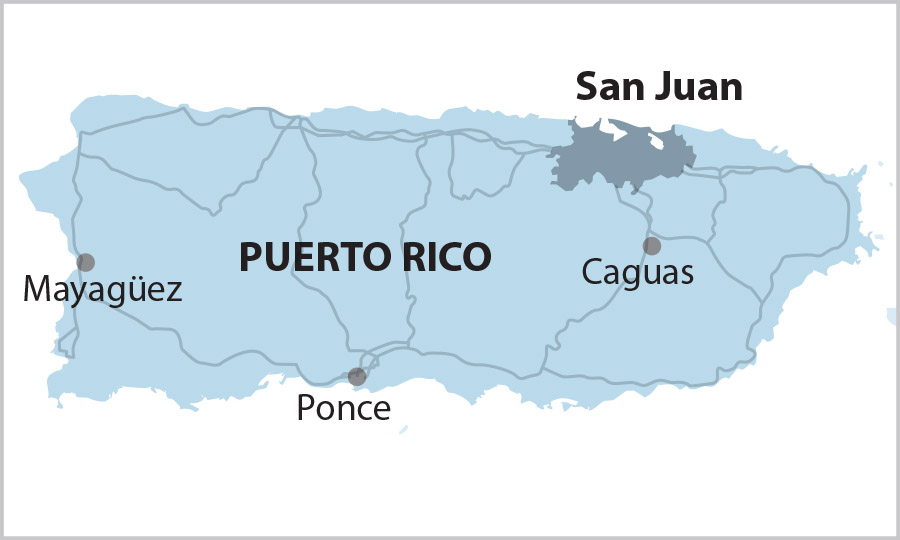IEEFA Puerto Rico: PREPA utility debt deal repeats mistakes of the past
 October 6, 2019 (El Nuevo Día) ‒ The people of Puerto Rico are about to be hit with an unaffordable $8.2 billion debt deal that will increase electricity rates for 47 years, hurting the island’s economic recovery. And no one in the Puerto Rican government or the Puerto Rico Electric Power Authority (PREPA) is able to defend it. We know that because no official will appear in bankruptcy court to testify that this deal is in the public interest.
October 6, 2019 (El Nuevo Día) ‒ The people of Puerto Rico are about to be hit with an unaffordable $8.2 billion debt deal that will increase electricity rates for 47 years, hurting the island’s economic recovery. And no one in the Puerto Rican government or the Puerto Rico Electric Power Authority (PREPA) is able to defend it. We know that because no official will appear in bankruptcy court to testify that this deal is in the public interest.
How is this possible? Because once again leaders of the Commonwealth are turning over Puerto Rico’s finances to self-serving outside experts.
One more flagrant example of a reckless disregard for Puerto Rico’s interests by outside financial advisors
It seems this huge multi-billion-dollar deal will be approved under a temporary, unelected governor, who may not run for election and who has no competent government advisor that would be held accountable for this decision. With Puerto Rico’s history of political instability, what kind of assurances are investors being given that allows a temporary steward to sign off on billions of dollars of obligations and decades of future budget payments? This is one more flagrant example of a reckless disregard for Puerto Rico’s interests by outside financial advisors.
EVEN THE LEADERSHIP OF THE POWER AUTHORITY IS MISSING IN ACTION. The Commonwealth testified that PREPA executive director José Ortiz was “not involved” in the debt negotiations. PREPA’s leaders approved the deal, but they cannot defend it.
The only Puerto Rican government official who has testified, Christian Sobrino, was fired from his role as lead negotiator and executive director of the Puerto Rico Fiscal Agency and Financial Advisory Authority. In August, it was announced that an outside consultant, Fernando Batlle of Boston-based Ankura Consulting, not a government official, would replace Sobrino’s tainted testimony.
How did Puerto Rico get into this fiscal mess? The Financial Oversight and Management Board’s (FOMB) investigator, Kobre & Kim, found that the approval of complex transactions was based on advice from external consultants with conflicts of interests. Investigators documented that PREPA lost people with expert knowledge as a result of frequent staff turnover and hiring of incompetent political employees, a trend that continues today. Prior to the FOMB investigation, the Puerto Rico Commission for the Comprehensive Audit of the Public Credit discovered negligence by Puerto Rico’s outside army of lawyers, accountants and advisors.
There is no one in the government of Puerto Rico with enough knowledge of the deal to defend it
According to Sobrino’s testimony, he was the only official from the Puerto Rican government directly involved in the negotiations for the debt deal. Sobrino’s testimony shows that he was dependent on Ankura Consulting’s advice. A bad deal for Puerto Rico was agreed to and there is apparently no one in the government of Puerto Rico with enough knowledge of the deal to defend it. Meanwhile, Puerto Rico’s finances remain out of control.
THE FOMB IS SUPPOSED TO WORK FOR PUERTO RICO’S LONG-TERM FISCAL RECOVERY. Yet, the Board supports the PREPA debt deal without any analysis that shows the economy of Puerto Rico can support repayment at the level proposed. The power authority’s own most recent Fiscal Plan approved by FOMB clearly shows that rates that result from the deal are too high. The Commonwealth’s Fiscal Plan projects that the government will have continuing budget deficits starting in FY 2027.
In supporting this bad deal, the FOMB is ignoring the fact that Puerto Rico’s citizens may be forced to pay for debt they should not be held responsible for. The FOMB stated in a separate PREPA-related lawsuit that PREPA was bankrupt in 2011. PREPA has issued $1.3 billion of debt since then. Was it legally issued? A suit brought by bond insurers has called into question another $3.7 billion in PREPA debt. Why agree to pay this astronomical amount if Puerto Ricans do not owe it?
Any one of these factors – lack of economic analysis, questions about debt legality, no one accountable for the deal and a signatory who will be gone in a matter of months – should be seen as a fatal flaw. As a result, the Governor and the FOMB should withdraw their support.
Tom Sanzillo ([email protected]) is IEEFA’s director of finance.
This op-ed appeared October 6 in El Nuevo Día: El acuerdo de deuda de AEE repite errores del pasado
RELATED ITEMS:
IEEFA op-ed: Insurers sue banks over Puerto Rico debt and bond deals
IEEFA report: Puerto Rico Electric Power Authority debt deal weak and plagued by scandal
IEEFA update: Puerto Rico crisis shows FOMB failed to do its job















